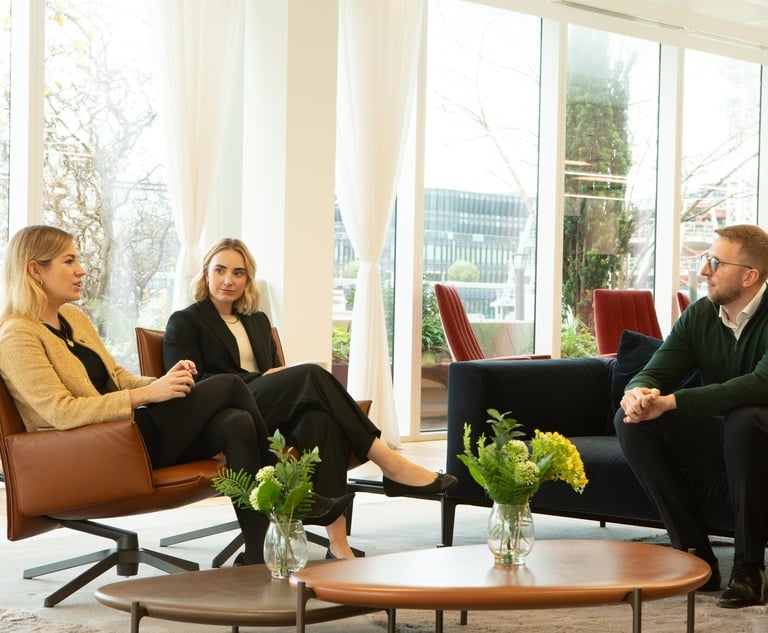Law Firms in Germany Are Having to Find New Ways to Lure Junior Lawyers
A competitive recruitment market is forcing top domestic firms to think up work-life balance initiatives in an effort to keep the younger generation happy.
November 14, 2019 at 04:41 AM
7 minute read
In 2016, Thomas Schmidt, head of HR and strategy Europe at Linklaters, was grappling with a problem. Due to a hot recruitment market, the firm was finding it tougher to attract junior lawyers to its German offices and also to retain them.
So Schmidt started asking the firm's associates in Germany in focus groups what they cared about and what they wanted from the firm.
"A key theme that came out was for a more controllable work life," he said. They wanted to know they would be able to attend say a friend's birthday on a Friday night or pick up their children from school during the week.
As a result in 2017, Linklaters piloted a scheme to offer its German associates the option of taking a pay cut in order to not work in the evenings or at weekends.
Associates on the 'YourLink' scheme, which was rolled out across the firm's German offices in 2018, are paid about €80,000 instead of the typical starting salary of €120,000 in return for working a guaranteed 40-hour week. Some 19 lawyers are now signed up to the scheme – perhaps surprisingly for those who tend to associate flexible working with women, a little over half of them are men.
Schmidt said the scheme is an important way the firm is trying to retain junior lawyers.
"The driver behind YourLink is the shortage of legal talent in the German market," he said, adding that lawyers currently on the scheme "would certainly have gone in-house or to the government" if they had not been able to limit their hours.
Linklaters is not alone in finding it difficult to attract and retain junior lawyers in Germany. Local and international firms across the country are struggling with a competitive recruitment market. As a result, many firms are now trialling new ways of working to improve work-life balance in an effort to keep their junior lawyers happy.
Hot market for talent
Fee Rahel Schlaegel, a consultant at Frankfurt-based recruiter Schollmeyer & Steidl said she had seen "increasing demand and very strong competition among law firms of all sizes" for junior lawyers.
"Nearly every major law firm is currently looking for highly qualified candidates," she said. "Work-life balance of course has become the topic for a lot of candidates… Many candidates are willing to make sacrifices money-wise to gain private quality time."
In part, this competitive recruitment market is because fewer people are qualifying as lawyers in Germany. More than 10,300 people qualified as lawyers in Germany in 2000, but by 2017 that had fallen to a little more than 7,500, according to most recent data available from the German Federal Office of Justice. Elite law firms typically require top marks, a high proficiency in English and postgraduate training such as an LLM or doctorate – further whittling down the candidate pool.
It is also a long process to qualify as a lawyer, with associates typically hired by law firms when they are between 27 and 30 years old, much older than trainees in the UK who are typically hired at 22 to 23 years old.
Meanwhile, junior lawyers are being tempted by jobs with public prosecutors, which typically have gold-plated pensions. And scores of younger lawyers are indisposed, having been pulled onto short-term project work on the biggest legal case of recent years – the diesel car emissions scandal – with Germany's first ever class action lawsuit, as well as the prosecution of top car executives at a variety of car companies.
This is at a time when law firms in Germany have continued to grow because of the relatively strong German economy.
Vera Jungkind, a partner at Duesseldorf-based law firm Hengeler Mueller, agreed that it was getting harder to recruit junior lawyers, in part because working at a law firm is less appealing than working in-house or for a judge or public prosecutor.
"It's very competitive. There is a decreasing number of graduates and I think the law firms are not so attractive anymore compared to other jobs in the legal profession." She added that firms now needed to tackle their "sweatshop sort of image" by showing "that it's about the quality of the work and not so much about the hours and the face time in the office".
She said Hengeler Mueller, which has more than 1,000 employees across seven offices, was trying to do just that by offering sabbaticals, longer unpaid career breaks, working from home arrangements and a range of ways to work part-time. Jungkind said that while these options had been in place for a while, they have now become formal policies that are becoming "more and more popular" with their staff and more regularly discussed at interview.
Other local firms are following suit. Noerr, for instance, says on its careers website that apart from rare exceptions, "weekends and public holidays are sacrosanct" and that it wants associates to have "enough downtime to let you recharge your batteries". It also details its parental leave policies, part-time working, working from home and sabbaticals policies.
Salaries not a differentiator
In London, law firms have dealt with competition by hiking salaries for junior associates, with six figure salaries now common at U.S. and Magic Circle law firms. Associate salaries in the German market are high, at about €120,000 at Magic Circle firms and about €100,000 for top tier German firms, according to the legal student magazine Azur.
Nicola Gebhardt, a manager at recruitment firm SSQ, said associate pay had increased moderately in the past two years but that salary was no longer the great differentiator for firms.
"Everybody is paying high salaries, so this is not the best tool at the moment to find younger people. Generation Y is not looking that much at salaries compared to the generation before," she said. "What's more important is flexible working, the possibility of home office, to take paternity leave and the career track."
International law firms are also looking at new ways of working and recruitment. Freshfields Bruckhaus Deringer offers recruitment cookery classes, where prospective employees get to know the team and a partner by preparing a meal with them. The firm also has the 'Smart Balance' scheme for its German lawyers, which allows lawyers to work remotely or from different offices, as well as part time
Mario Hüther, a capital markets and finance partner at Freshfields, said the firm was increasingly meeting top candidates that did not want to move from cool cities, like Berlin, to financial and industrial centres, like Frankfurt – something that was rare 10 or 15 years ago. He said that as a result of this, the firm is looking at more radical changes to the way it recruits.
"I would expect that in the future we will be more focused on recruiting where the people would like to be and not where our offices are or where our clients are sitting," he said. "The world has changed and to win the top talent you have to offer what they are looking for."
This content has been archived. It is available through our partners, LexisNexis® and Bloomberg Law.
To view this content, please continue to their sites.
Not a Lexis Subscriber?
Subscribe Now
Not a Bloomberg Law Subscriber?
Subscribe Now
NOT FOR REPRINT
© 2025 ALM Global, LLC, All Rights Reserved. Request academic re-use from www.copyright.com. All other uses, submit a request to [email protected]. For more information visit Asset & Logo Licensing.
You Might Like
View All
Paul Weiss Says Progress Means 'Embracing the Uncomfortable Reality'
5 minute read

GCs Say They are Getting 'Edged Out' of UK Boardrooms

‘We’re In Need of a Fix’—Is London’s Litigation Market in Trouble?
Law Firms Mentioned
Trending Stories
- 1Judicial Conference Declines Democratic Request to Refer Justice Thomas to DOJ
- 2People in the News—Jan. 2, 2025—Eastburn and Gray, Klehr Harrison
- 3Deal Watch: Latham, Paul Weiss, Debevoise Land on Year-End Big Deals. Plus, Mixed Messages for 2025 M&A
- 4Bathroom Recording Leads to Lawyer's Disbarment: Disciplinary Roundup
- 5Conn. Supreme Court: Workers' Comp Insurance Cancellations Must Be Unambiguous
Who Got The Work
Michael G. Bongiorno, Andrew Scott Dulberg and Elizabeth E. Driscoll from Wilmer Cutler Pickering Hale and Dorr have stepped in to represent Symbotic Inc., an A.I.-enabled technology platform that focuses on increasing supply chain efficiency, and other defendants in a pending shareholder derivative lawsuit. The case, filed Oct. 2 in Massachusetts District Court by the Brown Law Firm on behalf of Stephen Austen, accuses certain officers and directors of misleading investors in regard to Symbotic's potential for margin growth by failing to disclose that the company was not equipped to timely deploy its systems or manage expenses through project delays. The case, assigned to U.S. District Judge Nathaniel M. Gorton, is 1:24-cv-12522, Austen v. Cohen et al.
Who Got The Work
Edmund Polubinski and Marie Killmond of Davis Polk & Wardwell have entered appearances for data platform software development company MongoDB and other defendants in a pending shareholder derivative lawsuit. The action, filed Oct. 7 in New York Southern District Court by the Brown Law Firm, accuses the company's directors and/or officers of falsely expressing confidence in the company’s restructuring of its sales incentive plan and downplaying the severity of decreases in its upfront commitments. The case is 1:24-cv-07594, Roy v. Ittycheria et al.
Who Got The Work
Amy O. Bruchs and Kurt F. Ellison of Michael Best & Friedrich have entered appearances for Epic Systems Corp. in a pending employment discrimination lawsuit. The suit was filed Sept. 7 in Wisconsin Western District Court by Levine Eisberner LLC and Siri & Glimstad on behalf of a project manager who claims that he was wrongfully terminated after applying for a religious exemption to the defendant's COVID-19 vaccine mandate. The case, assigned to U.S. Magistrate Judge Anita Marie Boor, is 3:24-cv-00630, Secker, Nathan v. Epic Systems Corporation.
Who Got The Work
David X. Sullivan, Thomas J. Finn and Gregory A. Hall from McCarter & English have entered appearances for Sunrun Installation Services in a pending civil rights lawsuit. The complaint was filed Sept. 4 in Connecticut District Court by attorney Robert M. Berke on behalf of former employee George Edward Steins, who was arrested and charged with employing an unregistered home improvement salesperson. The complaint alleges that had Sunrun informed the Connecticut Department of Consumer Protection that the plaintiff's employment had ended in 2017 and that he no longer held Sunrun's home improvement contractor license, he would not have been hit with charges, which were dismissed in May 2024. The case, assigned to U.S. District Judge Jeffrey A. Meyer, is 3:24-cv-01423, Steins v. Sunrun, Inc. et al.
Who Got The Work
Greenberg Traurig shareholder Joshua L. Raskin has entered an appearance for boohoo.com UK Ltd. in a pending patent infringement lawsuit. The suit, filed Sept. 3 in Texas Eastern District Court by Rozier Hardt McDonough on behalf of Alto Dynamics, asserts five patents related to an online shopping platform. The case, assigned to U.S. District Judge Rodney Gilstrap, is 2:24-cv-00719, Alto Dynamics, LLC v. boohoo.com UK Limited.
Featured Firms
Law Offices of Gary Martin Hays & Associates, P.C.
(470) 294-1674
Law Offices of Mark E. Salomone
(857) 444-6468
Smith & Hassler
(713) 739-1250







